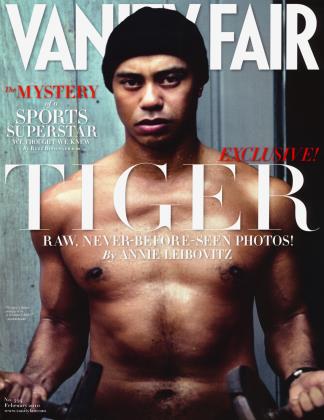Sign In to Your Account
Subscribers have complete access to the archive.
Sign In Not a Subscriber?Join NowHOT TYPE ELISSA SCHAPPELL
FANFAIR
ow that the first decade of the 21st century has shuddered to a close, many of us would rather chew off an arm than relive the morally and financially disastrous bender we’ve been on. We watched Lady Liberty get mugged, let bullies shake us down for our civil rights, and permitted the cretins who once sold us “Ketchup is a vegetable” to convince us that a “Band-Aid is health care.” But take heart, my fellow Americans—while they were spying on us, these authors had them under surveillance.
In 2004, the first shocking photos from Abu Ghraib were leaked and, even more shockingly, explained away—to the outrage of poet Nick Flynn. Wrestling with the demons of old addictions, sabotaged love affairs, and memories of a now homeless con-man dad and a single mom who killed herself, Flynn was ignited by these photos of disgraced Iraqis—thrown on the fire of a new relationship—to write his memoir, The Ticking Is the Bomb (Norton). His search for the meaning of fatherhood in the era of terror is remarkable not only for the nimbleness with which he pulls these threads together—observations of former prisoners are woven with meditations on loss—but also for its empathy and unshrinking honesty. It’s a declaration that the ticking of the bomb can also be the beating of the heart.
Our corrupt and beleaguered financial system is the backdrop for the human dramas at play in Adam Haslett's debut novel, Union Atlantic (Nan A. Talese). Novelist Jonathan Dee proves himself to be a first-class observer of contemporary society—particularly those sets who maintain a more than healthy distance from their emotions and a less-than-sterling sense of morality. Dee’s portrait of a newly wealthy Manhattan couple—with boundless yearning for The Privileges (Random House) that their class commands—is rich in empathy and revelation.
We have two options, Al Gore proclaims: either clean up our mess or start checking out real estate on other planets. But, it’s Our Choice (Rodale). Here’s another frightening reality: more than half the world’s 200 largest economies are corporations. And even if their boards are sworn to keep the C.E.O.’s honest, every day—as John Gillespie and David Zweig expose in Money far Nothing (Free Press)—is casual-ethics Friday. As long as we’re on the subject of impropriety, P. D. James, the doyenne of crime writers, drops clues in Talking About Detective Fiction (Knopf) as to why the genre is more popular than ever: it “confirms our belief, despite some evidence to the contrary, that we live in a rational, comprehensible and moral universe.” We live in hope.
 View Full Issue
View Full Issue






Subscribers have complete access to the archive.
Sign In Not a Subscriber?Join Now